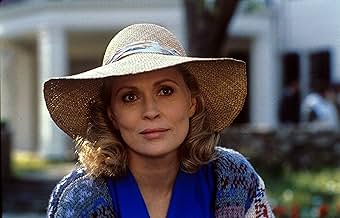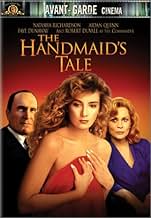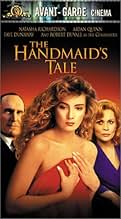In una tirannia religiosa distopica, una giovane donna viene messa in schiavitù sessuale a causa della sua rara fertilità.In una tirannia religiosa distopica, una giovane donna viene messa in schiavitù sessuale a causa della sua rara fertilità.In una tirannia religiosa distopica, una giovane donna viene messa in schiavitù sessuale a causa della sua rara fertilità.
- Regia
- Sceneggiatura
- Star
- Premi
- 2 vittorie e 1 candidatura in totale
Reiner Schöne
- Luke
- (as Rainer Schoene)
Robert D. Raiford
- Dick
- (as Robert Raiford)
Recensioni in evidenza
This is a nightmare vision of the future. It seems 1 out of every 100 women is fertile (for some reason). The ones who aren't perform slave labor. The ones that are are "sold" off to rich families where they have sex with the husband to produce a baby. Kate (the late and missed Natasha Richardson) is one such servant to Serena Joy (Faye Dunaway) and her husband the Commander (Robert Duvall). Kate wants out--but it seems there's no way.
The synopsis only scratches the surface of a VERY dark and disturbing movie. It slowly shows how women are treated and used and it just gets more horrifying as it unfolds. The parallels to Hitler's Nazi Germany are fairly obvious but here we have barren women instead of Jews and gays. The good acting by everybody makes this hard to shake off. Aidan Quinn (as Nick) and Duvall are OK; Victoria Tennant is chilling as a leader of the camps; Elizabeth McGovern is just great as a fellow prisoner who befriends Kate; Dunaway is also very good in her role. Best of all is Richardson. This couldn't have been an easy role but she pulls it off beautifully. She died at far too young an age. This is basically an unknown movie and it's easy to see why--it's far too dark and disturbing for a general audience. However the ending is (sort of) uplifting (and changed from the book). Grim, dark and depressing. View it at your own risk. The ceremony sequences are almost impossible to watch and shocked the hell out of me the first time I saw this.
The synopsis only scratches the surface of a VERY dark and disturbing movie. It slowly shows how women are treated and used and it just gets more horrifying as it unfolds. The parallels to Hitler's Nazi Germany are fairly obvious but here we have barren women instead of Jews and gays. The good acting by everybody makes this hard to shake off. Aidan Quinn (as Nick) and Duvall are OK; Victoria Tennant is chilling as a leader of the camps; Elizabeth McGovern is just great as a fellow prisoner who befriends Kate; Dunaway is also very good in her role. Best of all is Richardson. This couldn't have been an easy role but she pulls it off beautifully. She died at far too young an age. This is basically an unknown movie and it's easy to see why--it's far too dark and disturbing for a general audience. However the ending is (sort of) uplifting (and changed from the book). Grim, dark and depressing. View it at your own risk. The ceremony sequences are almost impossible to watch and shocked the hell out of me the first time I saw this.
There's nothing subtle about this screen adaptation of Margaret Atwood's cautionary fable, but the premise is nothing if not provocative: in a repressive fundamentalist dictatorship (called Gilead, but ostensibly America in the near future) the few remaining fertile women are forced to bear children, in effect becoming sexual servants to the (male) powers-that-be. Gilead may be colored red, white and blue, but there's more than a passing resemblance to Orwell's Oceana; even the act of conception is reduced to a ritual, with the euphemism 'ceremony' doubling for intercourse. A talented cast does its best with Harold Pinter's typically inscrutable screenplay, but under Volker Schlondorff's dispassionate direction the film never achieves a convincing level of oppression or paranoia. Worse, it lacks a story to match its scenario; the handmaid Offred's redemption is achieved only with the help of another man, which seems to deflate the feminist slant. The final result is nowhere near a successful movie, but never less than a fascinating failure.
Margaret Atwood, a Canadian novelist (and poet) wrote the dark fantasy novel on which this film is based. It is set in The Republic of Gilead, formerly the United States, or at least the parts of it that are not radioactive. The radioactive parts are called the colonies, where bad girls are sent to die of radiation poisoning. The time is the near future, after the inevitable nuclear war, and the breakdown of government as we know it.
The society depicted in The Handmaid's Tale is a nightmare: everyone is watched by the Eyes, unknowable, unseen government spies. Women are forbidden to have jobs. They are irrevocably assigned to classes. At the top are the chaste, but morally superior, Wives, almost all of whom have been rendered infertile by the inevitable unclear war. At the bottom are the housekeepers, or Marthas, who are non-entities. In the middle are the Handmaids of the title, who are fertile, but tightly controlled. The term Handmaid is a Biblical term that is used in the Old Testament stories of Abraham, Sarah, Jacob and Rachel. In the Bible, the wives gave their handmaids to their husbands in order to produce heirs.
Handmaids, in the film and the book, are forced to have sex with the Commanders, the husbands of the Wives. During this sex, the Wives are intimately present to take in any "love" their Commanders have to give.
The Handmaids are trained to remain unattached to the Commanders. They are prohibited from using makeup or doing anything to make themselves attractive. Handmaids are forced to turn their offspring over to the morally "fit" Wives.
Robert Duvall, a Commander in whose home Offred is placed, gives a family Bible reading performance that will curdle the blood of true people of faith. It is a breathtaking, heart-stopping performance.
The government is totalitarian and monotheistic. The one god is very strict, and has His Eyes everywhere.
Offred, who was once known as Kate, is a Handmaid who, despite her training (read brainwashing), recalls her past, her loving husband, and her adored daughter. She tells with sparkling, and terrifying clarity, how the society came to be the way it is.
This governmental aspect of the story is instructive, however, they are almost totally absent in the film.
Offred's/Kate's personal story is heartrending. It reminds one of the miseries of, say, the women of Darfur. When the government breaks down, she and her husband and daughter attempt to flee to Canada. Unfortunately, they are caught. Her daughter is "confiscated." Her husband is taken away. She never sees her husband again.
Offred's training is not as extensively portrayed in the film as it is in the book, but her feeling of terror and helplessness are palpable, in an exquisite performance by Natasha Richardson. Warning, blood is shown.
As we ride down the slippery slope toward the overturning of Roe v. Wade, this film is a must see for those who still care about women's rights.
The society depicted in The Handmaid's Tale is a nightmare: everyone is watched by the Eyes, unknowable, unseen government spies. Women are forbidden to have jobs. They are irrevocably assigned to classes. At the top are the chaste, but morally superior, Wives, almost all of whom have been rendered infertile by the inevitable unclear war. At the bottom are the housekeepers, or Marthas, who are non-entities. In the middle are the Handmaids of the title, who are fertile, but tightly controlled. The term Handmaid is a Biblical term that is used in the Old Testament stories of Abraham, Sarah, Jacob and Rachel. In the Bible, the wives gave their handmaids to their husbands in order to produce heirs.
Handmaids, in the film and the book, are forced to have sex with the Commanders, the husbands of the Wives. During this sex, the Wives are intimately present to take in any "love" their Commanders have to give.
The Handmaids are trained to remain unattached to the Commanders. They are prohibited from using makeup or doing anything to make themselves attractive. Handmaids are forced to turn their offspring over to the morally "fit" Wives.
Robert Duvall, a Commander in whose home Offred is placed, gives a family Bible reading performance that will curdle the blood of true people of faith. It is a breathtaking, heart-stopping performance.
The government is totalitarian and monotheistic. The one god is very strict, and has His Eyes everywhere.
Offred, who was once known as Kate, is a Handmaid who, despite her training (read brainwashing), recalls her past, her loving husband, and her adored daughter. She tells with sparkling, and terrifying clarity, how the society came to be the way it is.
This governmental aspect of the story is instructive, however, they are almost totally absent in the film.
Offred's/Kate's personal story is heartrending. It reminds one of the miseries of, say, the women of Darfur. When the government breaks down, she and her husband and daughter attempt to flee to Canada. Unfortunately, they are caught. Her daughter is "confiscated." Her husband is taken away. She never sees her husband again.
Offred's training is not as extensively portrayed in the film as it is in the book, but her feeling of terror and helplessness are palpable, in an exquisite performance by Natasha Richardson. Warning, blood is shown.
As we ride down the slippery slope toward the overturning of Roe v. Wade, this film is a must see for those who still care about women's rights.
This movie, based on Margaret Atwood's story, concerns a woman living in the not too distant future in the Republic of Gilead, a country that was once the United States. The country is now run by fundamentalist Christians who have demoted all women to a second class citizenship. Nuclear war has made most women infertile, so the government has forced all the fertile women to serve as handmaids and bear children for the leaders and their infertile wives as part of a biblical prophecy. The infertile women are sent off to toil as slaves and clean up nuclear waste. This movie concerns one handmaid, Offred (Kate) and her struggle to escape Gilead, find her daughter, and flee to Canada. Not a bad movie at all, all the actors do very well. The material just runs very slow at points, and the character's aren't all that well developed.
An unfortunate movie which is definitely more like Harold Pinter's earlier plays than anything Margaret Atwood ever produced. No attempt is made to bring out Atwood's clever social message, and we're all supposed to be shocked at the sexual content. A shame, because Atwood's version might have made a good film.
Lo sapevi?
- QuizWhile working on the film, Robert Duvall became so fascinated with evangelism that it inspired him to write L'apostolo (1997).
- BlooperWhen Moira ties up Aunt Lydia and escapes the Red Center, it is late at night, but moments later, when she exits, it is clearly daytime.
- Colonne sonoreWhispering Hope
Written by Septimus Winner as Alice Hawthorne
I più visti
Accedi per valutare e creare un elenco di titoli salvati per ottenere consigli personalizzati
- How long is The Handmaid's Tale?Powered by Alexa
Dettagli
- Data di uscita
- Paesi di origine
- Sito ufficiale
- Lingua
- Celebre anche come
- El cuento de la doncella
- Luoghi delle riprese
- James Adams Buchanan House, 1810 Cedar St, Durham, Carolina del Nord, Stati Uniti(Commander Fred's house)
- Aziende produttrici
- Vedi altri crediti dell’azienda su IMDbPro
Botteghino
- Lordo Stati Uniti e Canada
- 4.960.385 USD
- Fine settimana di apertura Stati Uniti e Canada
- 738.578 USD
- 11 mar 1990
- Lordo in tutto il mondo
- 4.960.385 USD
- Tempo di esecuzione
- 1h 49min(109 min)
- Colore
- Mix di suoni
- Proporzioni
- 1.85 : 1
Contribuisci a questa pagina
Suggerisci una modifica o aggiungi i contenuti mancanti



































